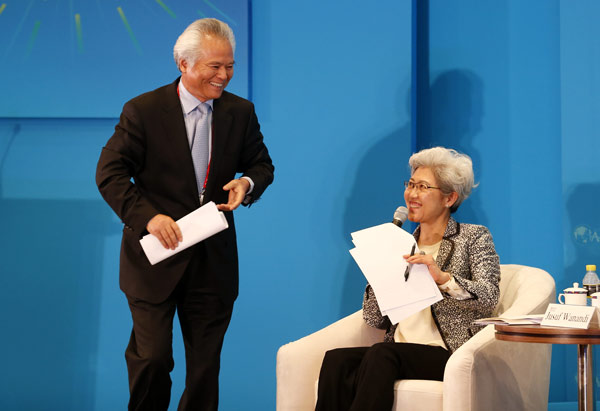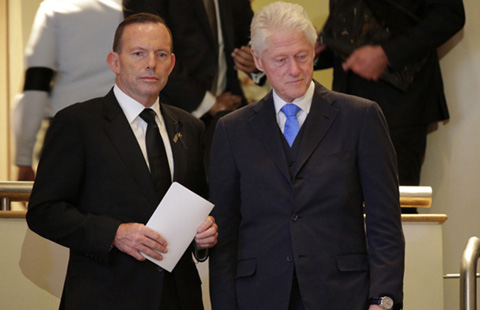China, US 'cannot afford' maritime dispute
Updated: 2015-03-30 04:00
By Deng Yanzi, Zhao Shengnan(China Daily)
|
||||||||
 |
|
Wu Shicun, president of the National Institute for South China Sea Studies, and Fu Ying, chairwoman of the National People's Congress Foreign Affairs Committee, join a panel discussion about progress in executing the Declaration on the Conduct of Parties in the South China Sea at the 2015 Boao Forum for Asia in Hainan province on Sunday. [Photo by Wu Zhiyi / CHINA DAILY] |
To smooth the choppy diplomatic waters of the South China Sea, observers said on Sunday that countries outside the region should not get involved into the overlapping territorial claims of China and some ASEAN countries.
The call followed President Xi Jinping's remarks on Saturday at the 2015 Boao Forum for Asia in Hainan province, about nurturing new security concepts in the region, as Asia explores various paths.
"All of us must oppose interference in other countries' internal affairs and reject attempts to destabilize the region out of selfish motives," Xi said at the opening ceremony of the 2015 Boao Forum for Asia.
He did not name a particular country. But the United States has stepped up its tone on South China Sea issue. The US and Japan have strengthened military ties with Southeast Asian countries that have competing territorial claims with China in the South China Sea, including the Philippines.
Wu Shicun, president of the National Institute for South China Sea Studies, said that because of the involvement of countries outside the region, the South China Sea has been deadlocked in a game of geopolitical competition, resources development and control of sea routes.
Zheng Yongnian, director of the East Asian Institute at National University of Singapore, said in a panel discussion that some allies of the US have overused or abused the relationship over the issue, with a fantasy.
"China and the US, the two most important economic pillars of the world, will not have any conflicts over the sea, since they cannot afford it," Zhang said.
Former president of the Philippines Fidel Valdez Ramos said the region should concentrate on maritime law enforcement and open commerce, which will help resolve the conflicting interests in the region.
Wu agreed, saying countries outside the region should maintain a neutral stance, while China and the ASEAN countries can jointly develop the sea, including its fishery and energy potentials, before a final settlement.
In the latest effort at reconciliation, China and the ASEAN will hold their 13th Joint Working Group Meeting on the Implementation of the Declaration on the Conduct of Parties in the South China Sea in Myanmar on Monday and Tuesday.
Officials and experts from all participating countries will meet to discuss navigation security, joint maritime search and rescue and other fields of practical cooperation.
Foreign Minister Wang Yi said on Saturday that China will follow a dual-track, agreed by China and most ASEAN countries, to properly handle disputes left over from history.
Under the dual-track approach, specific disputes are to be solved through negotiations and consultations by the countries directly concerned, and peace and stability in the region would be jointly upheld by China and ASEAN countries working together.
Contact the writers at zhaoshengnan@chinadaily.com.cn and iris@chinadailyhk.com
- China pledges dual-track approach to address South China Sea dispute
- South China Sea dispute not between ASEAN, China: Cambodian PM
- China urges ASEAN to stay neutral on South China Sea issue
- 'Mutual benefit' drives policy in South China Sea
- FM dismisses blame on China's land reclamation in South China Sea

 Students show support for Earth Hour
Students show support for Earth Hour
 Sleep with fish at Tianjin aquarium
Sleep with fish at Tianjin aquarium
 Moments of beauty and strength at ISU figure skating worlds
Moments of beauty and strength at ISU figure skating worlds
 Pier Antique Show in New York
Pier Antique Show in New York
 Rio bay won't be clean for sailing: organizers
Rio bay won't be clean for sailing: organizers
 Tech tycoons' take on innovation in BFA
Tech tycoons' take on innovation in BFA
 World dignitaries at state funeral of Lee Kuan Yew
World dignitaries at state funeral of Lee Kuan Yew
 Sandstorm shrouds Beijing
Sandstorm shrouds Beijing
Most Viewed
Editor's Picks

|

|

|

|

|

|
Today's Top News
Washington 'willing to work with AIIB'
Chinese woman charged with fraud remains in jail
Focus shifts to cause of NYC explosion after 2 bodies found
Warship arrives to evacuate Chinese nationals from Yemen
China, US 'cannot afford' maritime dispute
China-US 'new diplomacy' discussed
'Belt and road' blueprint boosts practical cooperation
China eyes $2.5 tln annual trade volume with Belt and Road countries
US Weekly

|

|






